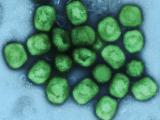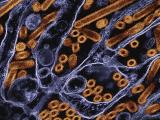Dec 2, 2010
About half of pregnant women got seasonal, H1N1 flu shots in 2009
Half of pregnant US women received seasonal flu vaccine last flu season, and just less than that received the pandemic 2009 H1N1 vaccine, according to data the Centers for Disease Control and Prevention (CDC) released today. That compares with seasonal flu vaccine uptake in this group of 24.2% and 11.3% for the previous two seasons. Writing in Morbidity and Mortality Weekly Report (MMWR), researchers who analyzed data from 10 states reported that 50.7% of pregnant women received seasonal flu vaccine during the past season and 46.6% received H1N1 vaccine. The rates ranged by state from 36.6% to 68.3% for seasonal vaccine and from 26.9% to 72.4% for the pandemic vaccine. In addition, women whose healthcare providers offered or recommended vaccine were three times more likely to get a seasonal flu shot and 10 times more likely to accept the pandemic vaccine. Among women who received the pandemic vaccine, 50.9% received it at an obstetrician/gynecologist's office, 25.7% at a health department or community clinic, and 14.5% at a family physician's office. The top reasons for not getting the H1N1 shot were concerns about effects on the unborn child (63.6%), concerns over effects on the mother (61.4%), and not being in the habit of getting a seasonal flu shot (57.6%).
Dec 3 MMWR report
Avian flu on Japanese chicken farm identified as H5
An avian influenza outbreak on a chicken farm in western Japan has been confirmed as caused by a highly pathogenic H5 virus, according to a report Japan filed with the World Organization for Animal Health (OIE). The virus killed 57 birds, and the remaining 21,549 birds on the farm in Shimane prefecture were destroyed to stop the outbreak, according to the report. The National Institute of Animal Health identified the virus as a highly pathogenic H5 strain. The report didn't specify if the virus was H5N1, but a Shanghai Daily report today quoted Japanese officials as saying the virus was genetically very similar to an H5N1 strain found in wild duck droppings in northern Japan in October. The last highly pathogenic avian flu outbreak in Japan occurred in April 2008, the OIE report said. Authorities are restricting movement within 10 kilometers of the affected farm.
US-Japanese partnership to develop cell-based H5N1 vaccine in Japan
US-based Baxter International Inc. and Japan-based Takeda Pharmaceutical Co. Ltd. today announced joint plans to develop and seek licensing of a cell-based H5N1 flu vaccine in Japan. Baxter granted Takeda an exclusive license to use Baxter's Vero cell–based flu vaccine technology in Japan, and Takeda will seek Japanese government funding to build a manufacturing facility using the technology, Baxter announced in a press release. Plans call for Takeda to begin full-scale manufacturing of the H5N1 vaccine by March 2014. A Baxter official called the agreement with Takeda "an important milestone in extending the field of cell culture–based vaccine development and production." The president of Takeda said the collaboration will establish "an infrastructure for pandemic vaccine production in Japan."
Dec 2 Baxter press release
Cholera hospitalizations in Haiti dip slightly
Cholera cases have been confirmed in all 10 of Haiti's departments, with deaths reported in 9 of them, the Pan American Health Organization (PAHO) reported yesterday. The highest rate of cases is still being reported in Artibonite department, followed by Northwest and Center departments. Haiti's health ministry has received reports of 77,208 cases, which include 34,248 hospitalizations and 1,751 deaths. The cholera hospitalization rate has decreased slightly, even in the departments experiencing the highest levels of disease activity, PAHO said. The neighboring Dominican Republic has reported 9 cholera cases, including 4 hospitalizations. It said one case was imported, while the other 9 are considered local infections. In other developments, the US Centers for Disease Control and Prevention (CDC) yesterday posted a notice advising people visiting the Dominican Republic to take precautions. The CDC urged travelers to take a travel health kit that includes a prescription antibiotic to take in case of diarrhea, water purification tablets, and rehydration salts. It also recommended following safe food, water, and hygiene practices.
Dec 1 PAHO epidemiological alert
Locally acquired malaria suspected in Florida woman
Health authorities in Duval County, Fla., have identified a Plasmodium falciparum malaria infection in a 31-year-old Jacksonville woman who has no history of international travel, the Duval County Health Department (DCHD) announced yesterday. An investigation by state, local, and federal officials is under way to determine if her infection was acquired locally. However, given the patient's lack of foreign travel, officials said the illness may be the county's first locally acquired malaria case in 10 years. Aside from this case, Florida has reported 111 malaria cases so far in 2010, but all were imported from other countries. Five of them were in Duval County. Health officials said that though the risk of ongoing transmission is low because of cooler and less humid weather, residents and healthcare providers should immediately report any suspected cases. The DCDH said it and the Jacksonville mosquito-control department will continue surveillance and prevention efforts and asked residents to take precautions against mosquitoes.
















